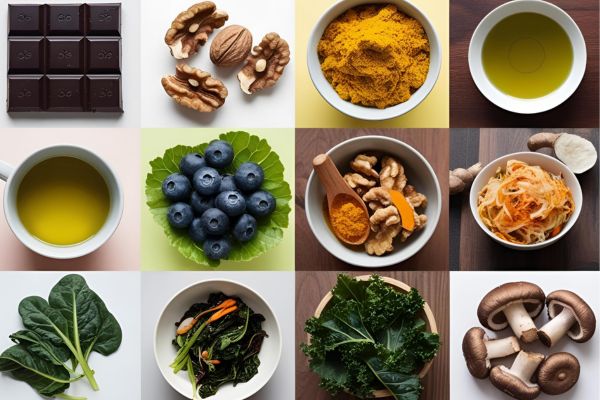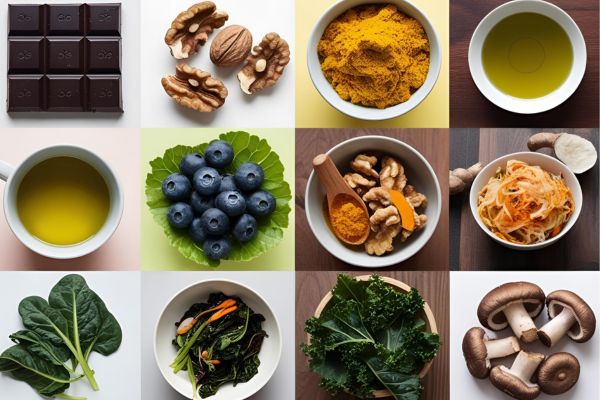If there were a way to slow aging, boost metabolism, and extend lifespan through diet, wouldn’t you want to know about it? Recent research suggests that certain foods can activate sirtuins—proteins responsible for cellular repair, inflammation reduction, and longevity. Scientists have been exploring how these compounds influence aging, and the results are promising. Incorporating these functional foods into your diet could be the key to not just living longer but thriving with optimal health.

1. Dark Chocolate (Cacao)
Dark chocolate, particularly those with high cacao content, is a rich source of polyphenols, especially resveratrol. This antioxidant has been shown to activate sirtuins, improving mitochondrial function and reducing oxidative stress. A 2022 study in The Journal of Nutrition found that moderate cacao consumption is linked to enhanced cardiovascular health and longevity. Just ensure you choose varieties with at least 85% cacao to maximize benefits while minimizing sugar intake.
2. Green Tea
Green tea is packed with catechins, particularly epigallocatechin gallate (EGCG), which has been found to stimulate sirtuin pathways. According to a 2021 study published in Aging Research Reviews, green tea not only boosts metabolism but also reduces inflammation, potentially extending lifespan. The combination of caffeine and antioxidants makes it a powerhouse for longevity and cognitive health.
3. Red Wine (Resveratrol)
Resveratrol, a compound found in red wine, is a well-known sirtuin activator. It mimics the effects of caloric restriction, a scientifically recognized longevity strategy. A study in Nature Communications (2020) confirmed that resveratrol enhances mitochondrial efficiency and protects against age-related diseases. While moderation is key—one glass per day for women and up to two for men—this beverage can be a longevity-enhancing indulgence.
4. Walnuts
Walnuts are rich in polyphenols, omega-3 fatty acids, and ellagitannins, all of which have been linked to sirtuin activation. Research published in The American Journal of Clinical Nutrition (2023) found that regular walnut consumption is associated with a lower risk of cardiovascular disease and improved cognitive function. These benefits make walnuts a great addition to any longevity-focused diet.

5. Turmeric (Curcumin)
Curcumin, the active compound in turmeric, has powerful anti-inflammatory and antioxidant properties. It activates sirtuins, helping to protect against neurodegenerative diseases and cellular aging. A 2022 study in Frontiers in Aging Neuroscience highlighted curcumin’s role in enhancing brain health and preventing age-related decline. Pairing turmeric with black pepper increases its bioavailability, maximizing its benefits.
6. Olive Oil (Extra Virgin)
Extra virgin olive oil is a staple of the Mediterranean diet, well known for promoting longevity. It contains oleuropein and hydroxytyrosol, both of which activate sirtuins and have strong anti-inflammatory effects. A 2021 study in The New England Journal of Medicine found that individuals who consumed olive oil regularly had a significantly lower risk of cardiovascular disease and cognitive decline. Opt for cold-pressed, high-quality olive oil to reap the maximum benefits.
7. Blueberries
Blueberries are loaded with anthocyanins, which enhance sirtuin activity and combat oxidative stress. According to a 2023 study in The Journal of Gerontology, regular blueberry consumption has been linked to improved brain function and a lower risk of Alzheimer’s disease. Their high fiber content and low glycemic index also make them an excellent choice for metabolic health.
8. Fermented Foods (Kimchi, Kefir, Sauerkraut)
Gut health plays a crucial role in longevity, and fermented foods provide probiotics that enhance gut microbiome diversity. These foods also contain polyphenols that activate sirtuins, contributing to improved metabolism and immune function. A study in Cell Metabolism (2022) found that a healthy gut microbiome is essential for maintaining youthful cellular function, emphasizing the importance of probiotic-rich foods in a longevity diet.
9. Dark Leafy Greens (Kale, Spinach, Swiss Chard)
Dark leafy greens are high in quercetin, a compound that activates sirtuins and reduces inflammation. Research published in The American Journal of Clinical Nutrition (2022) suggests that diets rich in leafy greens contribute to slower cognitive decline and improved metabolic health. Their high fiber and nutrient density make them an essential addition to any longevity-focused diet.
10. Mushrooms (Reishi, Lion’s Mane, Shiitake)
Certain medicinal mushrooms, such as reishi and lion’s mane, contain bioactive compounds that activate sirtuins and support immune function. A 2023 study in Nature Aging found that regular consumption of these mushrooms is linked to neuroprotection and extended lifespan in animal models. Their adaptogenic properties help combat stress, a major factor in aging.
FAQs
What are functional foods?
Functional foods are nutrient-rich foods that provide health benefits beyond basic nutrition. They contain bioactive compounds that support disease prevention, improve metabolism, and enhance overall well-being.
What is the difference between superfood and functional food?
Superfoods are nutrient-dense foods with high antioxidant levels, while functional foods include any food offering additional health benefits, such as probiotics in yogurt or omega-3s in fish.
Which are the 3 categories of functional foods?
Functional foods fall into three categories: natural (e.g., fruits, vegetables), fortified (e.g., vitamin D milk), and enriched (e.g., fiber-enriched bread) foods that promote health beyond basic nutrition.
What is another name for functional foods?
Functional foods are also known as nutraceuticals, bioactive foods, or designer foods, emphasizing their health-enhancing properties beyond basic dietary needs.
Why are functional foods important?
Functional foods help prevent chronic diseases, support immune function, enhance digestion, and promote overall longevity by providing essential nutrients and bioactive compounds beneficial for long-term health.
Foods for Longevity
The link between diet and longevity is stronger than ever, and sirtuin-activating foods offer a promising avenue for extending healthspan. Incorporating dark chocolate, green tea, olive oil, and other nutrient-dense foods into your daily routine can make a significant impact on aging gracefully. While genetics play a role, lifestyle choices—especially diet—are powerful tools for optimizing longevity. By making mindful choices today, you can set the stage for a healthier, more vibrant future.




